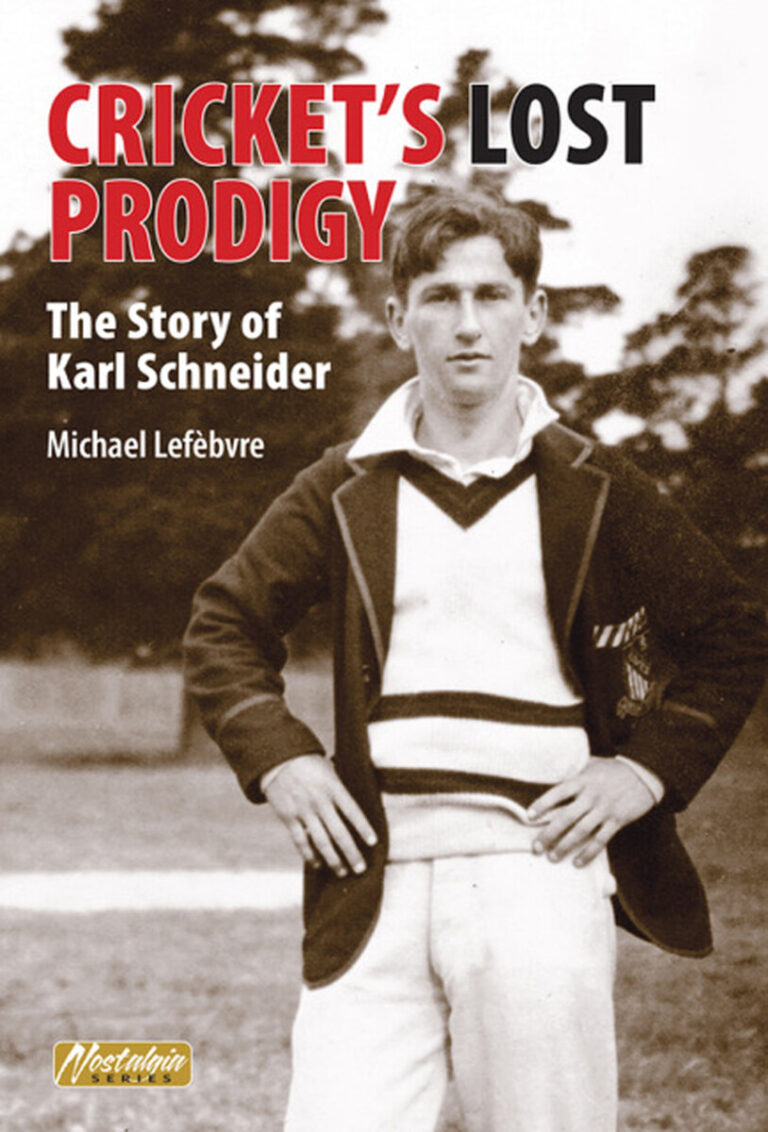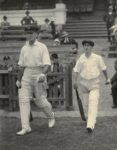No products in the cart.

Xavier College prodigy Karl Schneider was destined for stardom when selected ahead of a young Don Bradman for Australia’s 1928 tour of New Zealand, until cruelly being struck down by illness.
His feats were one so young were astonishing and included, while still a schoolboy, a major part in Victoria’s world record first-class score. A move to South Australia where he averaged 50-plus in two Shield seasons hastened his selection in an Australian touring team to NZ – ahead of a young Don Bradman.
Batting at No.3 for Australia in the final unofficial Test on that tour, Karl was considered a certainty to play in the home Ashes series in 1928-29. But while holidaying with the team on Mt Cook at the end of the tour, he fell ill and died five months later of leukaemia, aged 23. The young Don took his place in the Ashes team while Karl quickly fell into obscurity – the Age of Bradman was upon us.
Author Michael Lefebvre’s initial quick inspection of some donated family memorabilia disclosed a wealth of material: family trees, letters (spanning the 1870s to the 1970s), postcards, telegrams (of congratulations and condolence), school prize books and trophies, family and sporting photographs, dinner menus, newspaper clippings and posters , handwritten scorecards, field placings for cricket and game plans for football, university notes and exam papers, dance cards (with pencil attached), Melbourne Cricket Club season tickets and, promisingly, a tiny green diary for 1925 (which sadly Karl, maintained for only nine weeks).
Karl’s story is interesting and significant. His brief 23 years included events and episodes that are fascinating, not just in a sporting sense but also in the context of Australia’s social history in the periods before, during and immediately after World War One.
Here is a sample:
Karl didn’t live to play in the Ashes Tests of 1928-29, the series that saw the debuts of Bradman and the equally tragic Archie Jackson. As a specialist left-handed opener, Karl would almost certainly have replaced the retired Warren Bardsley at the top of the Australian batting order.
Within the book’s title, Cricket’s Lost Prodigy, is an implied question: what did cricket lose as a result of Karl Schneider’s premature death? Apart from becoming the ‘next Bardsley’, as Karl was regularly labelled, there were respected contemporary commentators who saw in his leadership and tactical nous, qualities that could have led to him eventually captaining the Australian Test team. Beyond that lofty possibility, due to the establishment circles in which he moved, he might also have become a leading coach or, like Bradman, a high-level administrator, or even become a commentator on the game either in the press or in the emerging world of broadcasting. But all is just speculation and cricket’s ‘loss’ is ultimately irrelevant when compared to the grief suffered by his devastated family.

The book is entitled: Cricket’s Lost Prodigy and is available for $70 posted anywhere within Australia exclusively from cricketbooks.com.au
You will love it.
Never miss a sale or new release. Subscribe to cricketbooks.com.au

Cricketbooks.com.au is Australia’s number 1 website and online store for cricket publications and memorabilia. Coordinated by Ken Piesse – Author, Commentator, Public Speaker, and Publisher – cricket books has Australia’s largest range of both new releases and classic collectibles, cigarette cards, rare photographs, and much more.
PO Box 868
Mount Eliza, Victoria 3930, Australia
Mob: 0419 549 458
Tel: (03) 9787-8023
Email: kenpiesse@ozemail.com.au